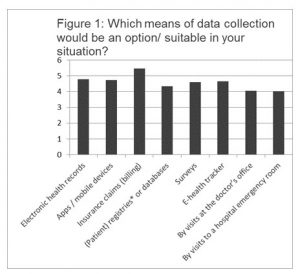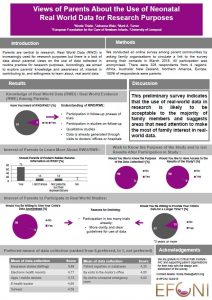Real world data (RWD) in medicine is data derived from a number of sources, for instance surveys or focus group interviews that are associated with outcomes in a heterogeneous patient cohort in real-world settings. It is increasingly used for research purposes, yet there is a lack of data about parental views on the use of this data which had been collected in routine practice for research purposes. But parents of neonates are central to research. Accordingly, EFCNI[1] in collaboration with the University of Liverpool[2], aimed to explore the parents’ knowledge and awareness of, their interest in contributing to, as well as their willingness to learn about RWD.
In order to find out about the parents’ standpoints, an online survey was conducted and shared among parent communities by asking parent organisations to circulate a link to the survey among their contacts in March 2018. All participation was anonymised.
There were 328 respondents from 4 regions: Africa; Australia/ New Zealand, Northern America, and Europe. 100% of respondents were parents. 9% of respondents had heard of the term „real world data“ before. 72% wanted to learn more, once the term was described. 98% of respondents were happy to contribute RWD about their baby to research projects, given that data was anonymised. 84% of respondents were happy for routinely collected data about follow-up to three years to be included. However, there were also reasons for parents to decline a participation in such data collection: These were a participation in too many previous trials or a need for more clarity and clear guidelines for the use of data. Means of data collection that were appropriate (ranking from 6 “strongly agree” to 1 “strongly disagree”) are shown in Figure 1. 98% of respondents wanted to know the purpose of data collection and receive the results of studies their baby had contributed to.
This initial survey indicates that the use of RWD in research is likely to be adequate to the majority of family members. Furthermore, it proposes areas that need attention to make the most of family interest in RWD.

Figure 1
[1]Nicole Thiele, Dr Johanna Walz (European Foundation for the Care of Newborn Infants)
[2]Professor Mark A. Turner (University of Liverpool)
Published in 10/2018


